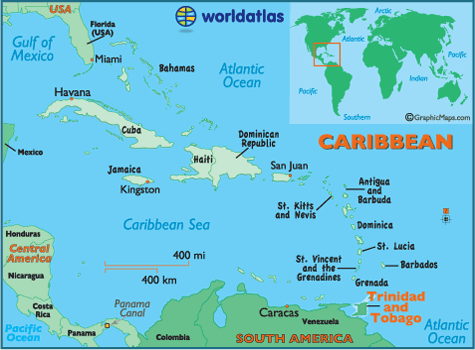Trinidad and its search for identity
Subject: Trinidad and its search for identity.

It's an interesting juxtaposition this attempt to see ourselves as others see us. In our conversation and our attempt to break down cultural barriers we try to put on the costume of the other person whilst all the time wondering what they think of us.
Each race, each individual is brought up under the influence of the people around them and form a view of life as seen through the lens of the cultural influence close by. We carry this cultural identification with us throughout our life and whilst in the modern process of learned mixing and multiculturalism we try to throw off our prejudice, we often fail to succeed.
But what if your society, the one you grew up in didn't have a culture of its own and only had a borrowed culture, a culture which had contaminated them, in this case from the USA, to such an extent that it saturated and dislodged their own sense of self worth.
Race has its roots in the assumption that you are what you are, your identity is written in, amongst other things, your skin colour and the identification it brings by amplifying a perceived difference. The question of whether this difference really exists is a moot point and whether it's impossible to be black without it linking you to Africa and Colonial Slavery. Even if you grew up out of Africa this sense of historical injustice swills through your thinking, and although sublimated by your surroundings it is closer to the surface than we think and it can soon be made the scapegoat for any ills a black person feels.
It's not the same for white people who live and grow up in those parts of the world which are predominantly black and which white people have come to identify as home. They don't carry the same historical baggage, they were not uprooted from their homes and carried half way across the world to fit some economic opportunity.
You carry your skin colour around with you for some like a sign to say this is who I am.
Frowned on by current thinking, where we must be the same, brothers and sisters all part of the same human family it never the less make a contrast as we walk down the street in East London, the nationalities, the dress code all contrive to announce I am different. Much like members of a family, we often see ourselves as being different to the other members of our family. The difference is in the interpretation we have of our own experience, it gives us that sense of our individuality and purpose. The rules which describe our ethnicity, our religion make us the people we are.
In Trinidad, unlike other island communities in the Caribbean, Trinidadians have sought to differentiate themselves both in terms of ethnicity, where they came from (Africa) and who they imagine they have become, living on the island of Trinidad. It's been suggested that the Trinidadian sees themselves as a work in progress. Being enamoured with white culture, their goals are seen to be someone else's and they play the transitory card which was thrust on them by the invasion of a white, predominantly US culture. This lack of a home grown cultural base has stripped them of their history and left them unequipped to value themselves for who they are and rather masquerade as wannabes, lost in the life style of an alien force, America.
The calypso is Trinidadian, the steel band is Trinidadian, the lyrics and their lingua franca is a rebellious short hand for English, a way of saying, "I am not who you think I am". It's one of the few attempts to identify themselves as separate from the artificial characters they see and hear on films and listen to each day on the radio and television. In that sense that they project themselves as a white James Cagney or a Lauren Bacall, aping the culture of the Hollywood stars, making them the identity they aspire to.
Culture matters, it's the linchpin pin which makes us identifiable, our values and even our prejudices are wrapped around in our culture and amidst the pressure to submit to multiculturalism, across this globalised world we had better understand that culture is important to better understand ourselves.

No comments:
Post a Comment